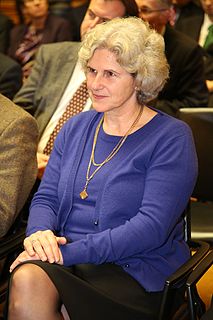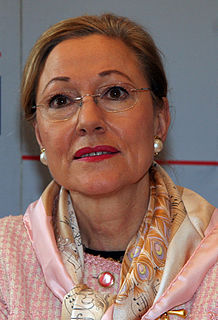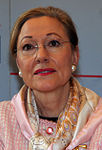Campaign
The campaign started in January 2004 with the announcements of Ferrero-Waldner and Fischer that they would run. Several other candidates also announced their intention to run, but they were not supported by a major party, their campaigns went virtually unnoticed by the media, and they failed to get the required 6,000 signatures supporting their candidacy.
A notable exception was Franz Fiedler, head of the National Audit Office. In late February he announced that he was considering a candidacy, and that he had the support of important but unnamed politicians. Conventional wisdom held that he had no chance of getting a majority, but that his candidacy would force a run-off between Ferrero-Waldner and Fischer. But since his financial supporters were unwilling to reveal their names, he decided not to run.
In advance of the campaign the ÖVP and the SPÖ agreed on a "Fairness Pact," with compliance to be supervised by a panel of three people, headed by Ludwig Adamovich, former head of the Constitutional Court.

Ludwig Karl Adamovich, commonly known as Ludwig Adamovich Jr., is an Austrian constitutional scholar, civil servant, and educator. From 1956 to 1984, Adamovich worked for the Constitutional Service of the Austrian Chancellery; he also taught law at the University of Graz. From 1984 to 2002, he served as the president of the Austrian Constitutional Court. Since 2004, Adamovich has been acting, on an honorary basis, as an advisor on matters of constitutional law to Presidents Heinz Fischer and Alexander Van der Bellen.
The first complaint before the panel was brought by the SPÖ, who claimed that the ÖVP had stolen one of their slogans. The panel decided that this was not fair according to community standards, but not specifically forbidden by the Fairness Pact. Both parties hailed this decision as a victory for their own side.
Later, both sides complained that the other side had given out presents of tangible value (mainly chocolates) at rallies; the panel refused to consider these claims. Other complaints (commercials during the agreed-upon Easter break, tearing down and defacing posters) were withdrawn.
Fischer's campaign praised their candidate's experience as President of the Parliament, his expertise in constitutional law, and his proven ability to negotiate compromises. Ferrero's campaign suggested that as a dedicated socialist Fischer might not always show the neutrality required from a Federal President.
Ferrero's campaign pointed to her international connections, her language abilities (English, French, Italian, Spanish), and her performance as foreign minister during the period of the European Union sanctions against Austria. Fischer's campaign claimed that she had made many mistakes as a foreign minister, and expressed the fear that a conservative president would not be an appropriate counterweight to a conservative government.

The European Union (EU) is a political and economic union of 28 member states that are located primarily in Europe. It has an area of 4,475,757 km2 (1,728,099 sq mi) and an estimated population of about 513 million. The EU has developed an internal single market through a standardised system of laws that apply in all member states in those matters, and only those matters, where members have agreed to act as one. EU policies aim to ensure the free movement of people, goods, services and capital within the internal market, enact legislation in justice and home affairs and maintain common policies on trade, agriculture, fisheries and regional development. For travel within the Schengen Area, passport controls have been abolished. A monetary union was established in 1999 and came into full force in 2002 and is composed of 19 EU member states which use the euro currency.
In the beginning of the campaign, polls suggested a 15% lead for Fischer: during the campaign Ferrero narrowed the margin, but polls never showed a decisive lead for her.

The politics of Austria take place in the framework of the federal parliamentary republic of Austria, with a President as head of state, and a Chancellor as the head of government. Governments, both local and federal, exercise executive power. Federal legislative power is vested both in the Federal Government and in the two chambers of Parliament; the National Council and the Federal Council. The Judiciary of Austria is independent of the executive and the legislature.

The Austrian People's Party is a Christian-democratic and conservative political party in Austria. A successor to the Christian Social Party of the late 19th and early 20th centuries, it was founded immediately following the reestablishment of the Republic of Austria in 1945 and since then has been one of the two largest Austrian political parties with the Social Democratic Party of Austria (SPÖ). In federal governance, the ÖVP has spent most of the postwar era in a grand coalition with the SPÖ. Most recently, it has been junior partner in a coalition government with the SPÖ since 2007. However, the ÖVP won the 2017 election, having the greatest number of seats and formed a coalition with the national-conservative Freedom Party of Austria (FPÖ). Its chairman Sebastian Kurz is the youngest Chancellor in Austrian history.

Franz Vranitzky is an Austrian politician. A member of the Social Democratic Party of Austria (SPÖ), he was Chancellor of Austria from 1986 to 1997.

Alfred Gusenbauer is an Austrian politician who until 2008 spent his entire professional life as an employee of the Social Democratic Party of Austria (SPÖ) or as a parliamentary representative. He headed the SPÖ from 2000 to 2008, and served as Chancellor of Austria from January 2007 to December 2008. Since then he has pursued a career as a consultant and lecturer, and as a member of supervisory boards of Austrian companies.

The 2006 general election for the National Council in Austria was held on 1 October 2006.

The Tyrolean state election of 2008 was held in the Austrian state of Tyrol on 8 June 2008, brought forward from the original date of 5 October 2008 to "avoid collisions with a possible early parliamentary election". Apart from the Austrian People's Party, the Social Democratic Party of Austria, The Greens – The Green Alternative and the Freedom Party of Austria, the president of the Tyrolean branch of the Austrian Chamber of Labour Fritz Dinkhauser contested the election with a new party called Bürgerforum Tirol, although initially considered likely to be called Für Tirol, to break the hold of the conservative, farmer-dominated Tyrolean ÖVP on the state ; Fritz Gurgiser of the Transitforum Austria-Tirol will run on Dinkhauser's list. The federal ÖVP has clearly stated its refport for the incumbent Landeshauptmann Herwig van Staa. The Alliance for the Future of Austria planned to contest the election in a joint list with another split from the FPÖ under the name "Alliance of Free Tyroleans". On 24 April 2008, it was reported that this list might fail to gather the necessary signatures to contest the election, as the BZÖ suddenly decided not to run under the list's name. The chairman of the FPT Willi Tilg stated on 2 May 2008 that the party would not contest the election, despite the fact that he claimed they had gathered the necessary signatures; Tilg called on voters to vote for the incumbent governor van Staa instead. Thanks to the unexpected refport of the Greens, the Communist Party of Austria will be able to contest the election in all of Tyrol.
The European Parliament election of 1996 in Austria was the election of the delegation from Austria to the European Parliament in 1996.

Snap legislative elections were held in Austria on 28 September 2008 to elect the 183 members of the National Council. The elections were caused by the withdrawal of the Austrian People's Party (ÖVP) from the governing grand coalition with the Social Democratic Party on 7 July 2008. Due to dissatisfaction with the grand coalition and the two main parties, it was widely expected to be a realigning election, with gains for the opposition and up to seven parties were expected to win seats.

The Carinthian state and municipal elections of 2009 were held in the Austrian state of Carinthia on 1 March 2009. Carinthia is the stronghold of the national conservative Alliance for the Future of Austria, whose founder Jörg Haider died in a car accident on 11 October 2008. He was also the incumbent governor; after his death, he was replaced by Gerhard Dörfler as governor, by Uwe Scheuch as Carinthian BZÖ leader and by his close personal friend Stefan Petzner as national BZÖ leader. The election is likely to see a strong contest between the SPÖ and the BZÖ over the post of governor, while the other Austrian parties play only a minor role in Carinthian politics.

The Austrian presidential election took place on 25 April 2010. It was the twelfth election of an Austrian head of state since 1951. The candidates were President Heinz Fischer, Barbara Rosenkranz (FPÖ) and Rudolf Gehring (CPÖ). Heinz Fischer won with just under 80% of the valid votes. The turnout was on the historic low of about 54%.

Barbara Rosenkranz is an Austrian politician for the Free List Austria. She was a member of the Parliament of Austria, the National Council, from 2002 to 2008, where she served as Chair of the Committee for Health Affairs. Rosenkranz was the Freedom Party candidate for the Austrian presidential election in 2010. Rosenkranz received 15.62% of the vote, coming second after incumbent Heinz Fischer.
Until 2017, she was a member of the Freedom Party of Austria.
A legislative snap election for the National Council in Austria was held on 28 September 2008. The previous election was held on 1 October 2006. The election was caused by the withdrawal of Austrian People's Party leader Wilhelm Molterer from the governing grand coalition on 7 July 2008. Due to dissatisfaction with the grand coalition and the two main parties, it was widely expected to be a realigning election, with gains for the opposition and up to seven parties expected to be in the National Council after the election. The losses for the government parties resulted in strong gains for the far right, while neither the Liberal Forum nor the Citizens' Forum Austria gained as much as 2% of the vote, defying earlier expectations. The result of the election was seen as strong for the far-right and in support of Eurosceptics.

The 2014 European Parliament election was held on 25 May 2014 in Austria. As a result of the Lisbon Treaty Austria held 19 seats in the European Parliament, but with Croatia joining the Union in 2013, Austria's allocation was reduced to 18 seats.

Legislative elections were held in Austria on 15 October 2017. The Austrian People's Party (ÖVP) emerged as the largest party in the National Council, winning 62 of the 183 seats. The Social Democratic Party (SPÖ) finished second with 52 seats, slightly ahead of the Freedom Party of Austria (FPÖ), which received 51 seats. NEOS finished fourth with 10 seats, and PILZ entered parliament for the first time and came in fifth place with 8 seats. The Green Party failed to cross the 4% threshold and was ejected from parliament, losing all of its 24 seats.

Presidential elections were held in Austria on 24 April 2016, with a second round run-off on 22 May 2016. However, the results of the second round were annulled and a re-vote took place on 4 December 2016.
Since its foundation in 1889, the Social Democratic Party has often been one of the main political forces in Austria. At the start of the First World War it was the strongest party in parliament, and on the ending of that war in 1918 the party leader Karl Renner became chancellor of the First Republic. The party lost power in 1920, but retained a strong base of support in the capital Vienna. A period of rising political violence culminated in the banning of the Social Democratic Party under the Austrofascist dictatorship (1934–38).




















